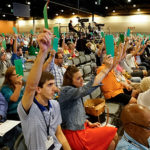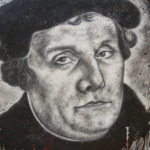I met someone in my neighborhood who asked about my profession. I said, “I’m a pastor.” The person asked what church, and I said the name of our Baptist church.
“I’ll never set foot in a Baptist church,” the person told me. We get that a lot.
It’s tempting to jettison the Baptist label to try to avoid association with negative assumptions people have. I get it. Some of the critiques leveled against those who use the Baptist label are critiques I’ve made myself. Others have been sources of valuable reflection and reformation about what I think about faith and church.
When I was in high school, I lived on a military base in Germany. It was just a short drive to the city of Worms, where Martin Luther is said to have proclaimed: “Here I stand. I can do no other.”
While the religious history was thick around me, I didn’t know anyone else who called themselves Baptist. People heard the word “Baptist” and immediately thought of Westboro Baptist Church and their horrifying signs.
In Central Texas in 2021, “Baptist” is much more commonplace, but it still comes with baggage. I regularly hear, “I didn’t expect a First Baptist to be like this,” as if “First Baptist” was the name of a franchise, with every town offering the same menu, color scheme and stereotypes.
I haven’t left the Baptist label behind. I don’t want to let the Baptist faith be co-opted and defined by its worst examples.
I still love the Baptist vision for expressing Christianity in a local church context. I hope to hold on to those things I think work, listen to the critiques, and work toward a future where “Baptist” is back to having seven characters, rather than being a four-letter word.
So, why am I still a Baptist?
Sign up for our weekly edition and get all our headlines in your inbox on Thursdays
Reasons I’m still Baptist
Polity
I’m still Baptist because of an authority structure that gives voice and power to the whole church.
One of the times Jesus talked about the inbreaking kingdom of God is recorded in Luke 13. Jesus said: “What is the kingdom of God like? And to what should I compare it? It is like a mustard seed that someone took and sowed in the garden; it grew and became a tree, and the birds of the air made nests in its branches” (Luke 13:18-19).
His hearers likely raised their eyebrows in surprise and suspicion, maybe like many of us have when someone said something we didn’t expect in front of a Baptist business meeting. Mustard plants are invasive. They wouldn’t be called great.
And yet, in God’s kingdom, what people roll their eyes at often becomes great.
I’m still a Baptist, because Baptist polity values the voices and experiences of regular people just like Jesus does. Each person has a vote, a voice, and the capacity to listen to and hear from God for direction.
Is it slow sometimes? Messy? Discouraging? Totally. But it can be great.
A few months ago, our church needed to decide on a recommendation to bless some of our local nonprofit partners with a financial gift. We had a business meeting. Different opinions were voiced. Disagreements were had. We voted. It was not unanimous.
But at the end of the spirited discussion, people stayed to talk. We laughed. And we asked about each other’s families. People who pushed back and canceled each other’s votes shook hands and smiled.
I almost forgot in 2021 it was possible to disagree and still love each other. But that always has been the vision of Christian community—a messy mustard bush with room for birds of all kinds of feathers to land.
Religious freedom
I’m still Baptist because of the freedom I believe all Christians have and should want for others.
There is much talk today about religious liberty in our country, but the temptation is to desire such liberty for those who have our religion, while being more restrictive for those with other expressions. Or perhaps we are tempted to use our liberty to infringe on the liberty of others.
Since the beginning of the Baptist faith, religious liberty for all has been a central distinctive that helped shape a vision for religious liberty in the United States as it was being formed.
Eighteenth century Baptist leader and abolitionist John Leland wrote: “The notion of a Christian commonwealth should be exploded forever. … Government should protect every man in thinking and speaking freely, and see that one does not abuse another. The liberty I contend for is more than toleration. The very idea of toleration is despicable; it supposes that some have a pre-eminence above the rest to grant indulgence, whereas all should be equally free, Jews, Turks, Pagans and Christians.”
Though Leland wrote this about 200 years ago, it’s a vision just as needed today. Baptists historically have desired religious freedom, not just for themselves, but for all. They’ve also carried that freedom into each church, exercising it to love and serve their community in the way they discern God is leading them.
The people
I’m still a Baptist because of the people.
I was baptized as a 7-year-old in the church into which I was born. Zion Baptist Church is an American Baptist congregation in the rural farmland near Slippery Rock, Penn.
My mom was a single teen when I was born, and that church was the village we needed to help my family raise me. Years later, I realized for some, my situation might have carried a stigma. I only ever felt love.
About 20 years after my baptism, I knelt just feet from the baptistry as leaders in the church laid hands on me and prayed for my ordination into ministry.
To be a Baptist, as Walter Shurden put it in The Baptist Identity: Four Fragile Freedoms, is to be a member of a Baptist church. That is, “if the sisters and brothers vote you in, you are a Baptist.”
There is something to this idea. It is not my degrees or gifts or social standing that make me a Baptist. My ethnicity or culture does not make me a Baptist. I’m a Baptist, because Baptist people welcomed me.
In their wildness and variety, their peculiarity and diversity, I found a branch to nest in.
Evan Duncan is the teaching and communications pastor at First Baptist Church in Temple and a member of the Baptist Standard board of directors. The views expressed are those solely of the author.














We seek to connect God’s story and God’s people around the world. To learn more about God’s story, click here.
Send comments and feedback to Eric Black, our editor. For comments to be published, please specify “letter to the editor.” Maximum length for publication is 300 words.